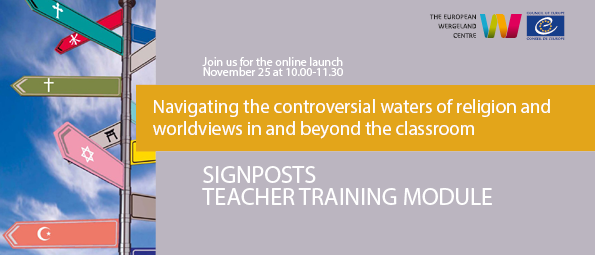Wednesday November 25, 2020 10.00-11.30
The launch event is co-organised by the European Wergeland Centre (Oslo) and the Council of Europe (Strasbourg).
Register for the online launch event here.

Moderators:
Mr. Matjaz Gruden, Director of Democratic Participation, Council of Europe
Ms. Ana Perona-Fjeldstad, Director of EWC
Panel:
Ms. Haldis Margrete Holst, Deputy General Secretary, Education International
Mr. Villano Qiriazi, Council of Europe Special Coordinator, DGII Democracy
Dr. Angelos Vallianatos – Teacher Trainer, Co-author of the manual, Greece
Dr. Kevin O`Grady, Independent Consultant and Researcher, Co-author, UK
Dr. Peter Schreiner, Director of the Comenius-Institute, Germany.
Why is a new pedagogical tool needed?
Teachers are the very “first responders” in many of the issues we face as a society as these issues are echoed by students in the classroom. Students’ and teachers’ religious and non-religious worldviews are one of these issues. Teachers must make sure that schools are places where students feel free to bring forward their thoughts, doubts and fears and discuss them in safe and sound ways.
In most European countries, even sensitive topics like human rights dilemmas between the freedom of belief and conviction and the freedom of expression should or could be raised in the classroom. Yet, school staff increasingly say they are reluctant or even afraid to face this task. Sometimes they self-censor when dealing with controversial issues that could offend. Many teachers feel that they do not get the support they need and that they do not have the necessary training and tools to tackle these questions.
European educational systems differ in the way they deal with religious and non-religious worldviews. Religion may or may not be taught at schools. Religious issues are in any case rarely discussed at the level that it concerns the private life of students or the public life of their parents. Nevertheless, religious issues are more present at school than ever before. Not only because in a diverse society, students and their families represent a greater diversity of religious and non-religious convictions and identifies; but also because our societies are confronted with terrorism that claims a religious motivation.
EWC and the Council of Europe developed Signposts teacher training module, over the past three years to address precisely some of these questions in teacher education. The aim of the training module is to offer methods for teachers to address issues connected to religion and non-religious world views in the framework of intercultural education.
Signposts Teacher Training Module is based on “Signposts – Policy and practice for teaching about religions and non-religious world views in intercultural education” which has been translated into 13 languages but also draws upon another Council of Europe publication: Living with Controversy – Teaching Controversial Issues Through Education for Democratic Citizenship and Human Rights (EDC/HRE) The manual has a solid basis and direct link to Recommendation CM/Rec(2008)12 of the Committee of Ministers to member states on the dimension of religions and non-religious convictions within intercultural education and the Council of Europe Framework of Competences for a Democratic Culture (RFCDC).
The term “religious dimension” in intercultural education is not used to refer to some type of religious education, but is aimed primarily at fostering reciprocal awareness, respect and learning how to live together, in order to promote social cohesion and civic participation by all in a democratic context, in which everyone feels accepted as an equal in terms of rights and dignity.